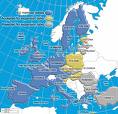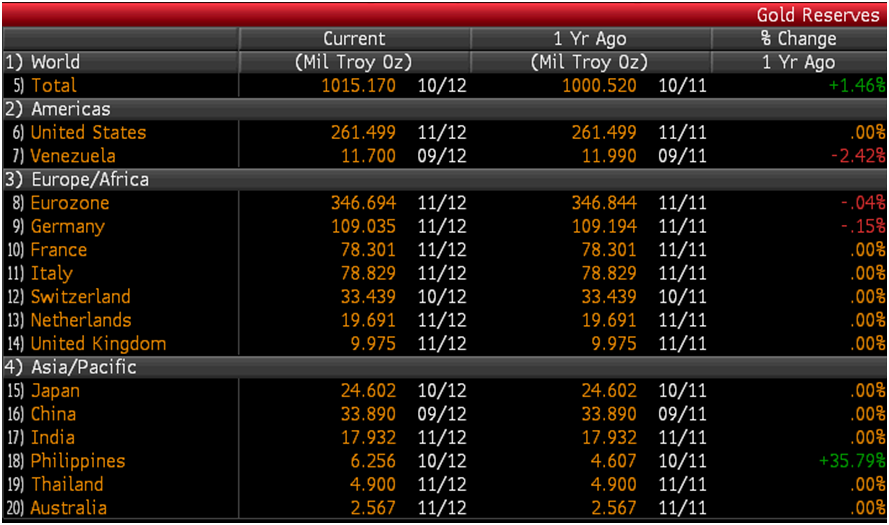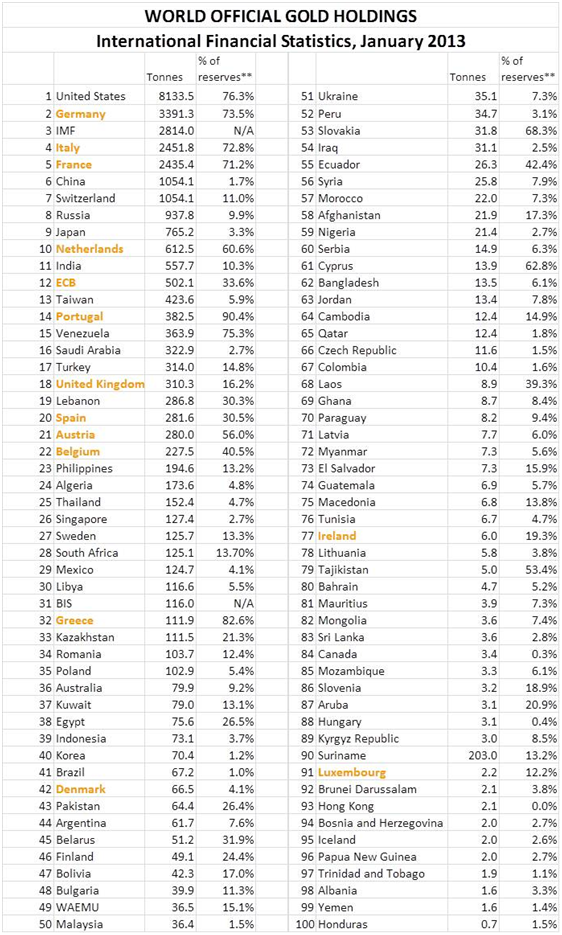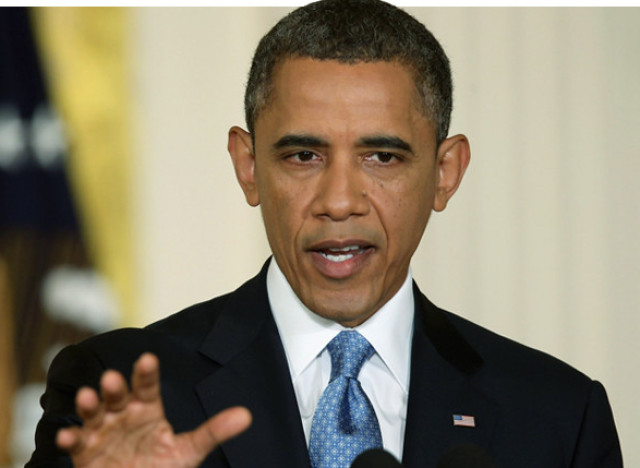In Europe we are at a new stage of class confrontation. Despite the systemic crisis not only of finance but of the whole of the mode of accumulation and reproduction of ‘financial market capitalism,’ this system has been able to maintain itself. Its transnational power – largely sustained by the nature of European integration and policies – has not been seriously cracked, despite the massive destruction of public and private goods, which is constantly becoming more extreme, deepening the great crisis.
In Europe, an ‘oligarchy’ has increasingly gotten hold of various powers; it is becoming radicalized and sees the moment as having come in which brutally to accelerate the dismantling of social and democratic gains, notably by profiting from the ‘crisis of public debt,’ generalizing austerity policies which, in turn feed the crisis.[1]
The strategy of systematic de-democratization is aimed at creating conditions for brutal austerity policy whose breadth of damage and suffering for the populations has begun to be visible, notably in the countries of southern Europe. One could indeed wonder, as Hervé Kempf does in Transform! No. 10 (2012),[2] if we are still living in a democracy. Due to the profoundly neoliberal nature of the EU’s very structure, the crisis is taking on a particularly acute and destructive character there. Jean Paul Fitoussi observes:[3]
“Much current policy in Europe has the effect of reducing the debt while at the same time destroying an increasingly large human capital.”
The headlong rush toward austerity and ever more authoritarian forms is bringing us to the edge of an abyss, with the danger of a collapse that could drag societies into chaotic turbulence. However, opting out of the Euro, not to say the disintegration of the EU, is no alternative[4] inasmuch as the logic governing the Euro and the EU and plunging our societies into the great crisis – for example, the financialization of the economy, making wage workers and territories compete against each other, social dismantling and impoverishment of societies, privatization and commodification, the authoritarian transformation of governmental and state entities – is equally at work at the level of countries, regions and enterprises. The deep causes of the great crisis of ‘financial market capitalism’ are to be sought in the over-accumulation of money capital, which develops simultaneously with a chronic weakness of accumulation and growth.[5] The Euro, in its present conception, transmits this logic, but we can perfectly well imagine another Euro, another European Central Bank, another way of treating the problem of public debt, another set of regulations and treaties favouring not competition but cooperation.
We do not know the timing and the forms of the earthquakes to come. But we do know that we have, to the greatest extent possible, to build up the power of interpretation, strength, the capacity for cooperation and political intelligence to be able to resist and at the same time open up the construction site for a deep refoundation of Europe. And to be able to refuse a nationalist approach that would mask the true nature of the conflict with the forces of capital and would run the risk of pitting against each other populations which suffer from the same logic. The history of the dismantling of Yugoslavia shows the degree to which ruins can generate mortal dangers. In a period when, in different countries, the categories of populations in the process of breakdown and who feel increasingly socially and culturally depreciated, lose trust in the institutions, political representation, ‘living together’ and solidarity as concepts governing societies, and the extreme and populist right find a very favourable terrain in the growing divisions with which to work. The strategies of the financial markets and of the big shareholders, just like EU policies, intensify the regional asymmetries at the European level, which inevitably create or exacerbate gaps between large regions and nurture nationalist postures. The transformation of the ‘market states’ of a neoliberal character into ‘authoritarian states’ also creates a favourable terrain for the extreme and populist right.
War of Position
In the face of the submission of public and political life to the requirements of the financial markets, to make the demand for a change of logic grow and propose completely new political paths to open up such a perspective constitute major challenges for the left. Despite the importance of the struggles and movements of recent years in a great number of countries, despite their creativity and their energy, they have rarely brought success. The dominant forces have tried everywhere to divide and disarm the subaltern classes. In our countries, the place and the role of trade unions are the object of unprecedented political and ideological attacks whose impulse often comes from EU orientations. However, at the same time, important and sometimes general strikes have grown in number. Occupy-type movements in Spain, Greece and elsewhere have shown the potential for resistance and mobilization to hold one’s head high in the face of political and ideological pressure in an increasingly tense social context, in search of an alternative logic and new political practices.
I do not share the view of those who characterize the present period as one of insurrection, as is sometimes done, notably by pointing to movements of the Occupy-type, which, certainly, know how to pose the basic questions, mobilize and influence public opinion, but without (at least for now) being capable of developing a durable struggle for the defence of common interests.[6] The present phase of confrontation rather seems marked by the coexistence of very contrasting phenomena: on the one side, protests, resistance, the emergence of new struggles and new actors, multiple attempts to re-make society, to reconstruct solidarity and a collective; on the other side, a strong sense of powerlessness and anxiety, of isolation, all of which produces resentments, withdrawal and notably the sense, among the most impoverished populations, that politics cannot / does not want to do anything for them.[7]
The current situation in Greece shows the extent to which one cannot yet know whether it is hope or fear that will win the day, in the same way as the French elections revealed a real potential for the Front de Gauche, but also its fragility. Greece is the first country where – in this context – an ‘earthquake election’ occurred, dramatically and profoundly upturning the political system that had been stable up to that point.[8] This was not just an election but the rise of a movement rooted in society, borne by political actors, movements and citizens who were able to pose the question of power at a moment when the parties which had up to then been dominant collapsed due to their records (on the national and European levels), which have been disastrous for the various societies. Syriza was able to build its programme and its activity by combining in an original way numerous forces in society in order to become at once a political coalition, a movement carrying the demands of political representation, a programme integrating many questions developed by the movements and the space in which popular unity manifested itself.[9]
“The Greek elections were elections that realigned classes. Syriza had gotten the highest percentages among the active population and particularly among wage workers in the private sector, the public sector, the unemployed, students and inhabitants of the poorest cities of Attica… Never before in the period after the end of the dictatorship (1974-2012) has there been an electoral moment with such a high degree of social polarization.”[10]
In receiving broad support for its alternative proposals Syriza was able to modify the relations of forces in a spectacular way. In this way the troika’s (European Commission, the International Monetary Fund and the European Central Bank) strategy could, for the first time, be seriously threatened.
In other European countries, we cannot speak of ‘earthquake elections’; however, there are increasing attempts at going beyond the fragmentation of the alternative left and of occupying the space to the left of social-democracy whose crisis continues. Certainly, social-democracy has been able to win some national elections when, rejecting austerity policies, the voters punished the right in power. In these cases, the return of social democracy to power does not in any way mean a ‘new departure’ in the direction of an alternative inasmuch as social democracy nowhere goes beyond the horizon of social liberalism and the EU’s neoliberal-based construction. For this reason, social democracy has not managed to project themes different from those of the right nor has it found new responses to the great crisis. In many countries, being in power and having itself put in place the austerity regime in Europe, social democracy has been heavily penalized, as in Greece, Spain, Portugal… The lasting crisis of social-democracy and of its main political choices opens, on the one hand, a space for the critical, alternative and radical left, but, on the other hand, blocks any prospect of a left majority for change.
The alternative left can indeed try to take up the challenge of this ‘historic window’[11] which has opened in this framework of a growing rejection of neoliberal logic and of the non-response of social democracy to the need for a change. It faces the need to position itself completely autonomously vis-à-vis social-democracy, but at the same time it must develop a strategy aimed at constructing new cultural and political majorities that cannot exist without a significant portion of the citizens, voters and activists who are situated close to social democracy. In numerous countries one of the conditions for creating a movement of dynamic agglomeration is the capacity to go beyond the fragmentation characteristic of the critical left. In this respect, there are not only selective attempts to constitute electoral alliances but also forms of common ‘fronts’ able to generate new political dynamics, beyond just the adherents of the parties involved.
For some years now, processes of new constructions have been in place, of which the most visible are now Syriza in Greece and the Front de Gauche in France. The fact that it is the Front de Gauche and not the NPA (New Anti-Capitalist Party) that has emerged in France’s political landscape demonstrates that there is a need, to the left of the PS, for a political dynamic not limited to organizing protest and which does not define itself as anti-PS (Socialist Party) and which tries to have direct weight on the terrain of the relation of political forces. The harshness of the confrontation, the extreme difficulty of scoring successes in the struggles, the relation of forces disadvantageous to those of resistance and struggle, have motivated a number of protagonists to look for new alliances beyond traditional ones, and this within both national and European spaces.
Strategic Issues
Bob Jessop[12] has proposed a determination, on the basis of an analysis of the economic, social, ideological and political conjuncture, of the strategic possibilities for actors aiming at social transformation in this specific period. The relative weakness of the dissenting forces before the explosion of the great crisis did not make it possible seriously to endanger neoliberal hegemony during the crisis. As a result, we find ourselves, in terms of the goal of going beyond the system, in a defensive phase of the struggle, which leads us to define our strategic objectives in terms of a ‘war of position.’ The critique of the true causes of the great crisis can and must be developed in the most radical and audible way possible, which was done very successfully in the presidential election in France through the ‘learning meetings’ organized by the candidate of the Front de Gauche, Jean-Luc Mélenchon. Not only was the financial sphere the object of a radical critique but also the entirety of the mode of accumulation and reproduction in the framework of ‘financial market capitalism,’ with its consequences for public space, the real economy, the state of public finances, democracy, the social situation, work and the individual. At the same time it was a matter of daring to pose the question of power, which Syriza was able to do and which is a factor of credibility in mobilizing people.
The necessary change of power, the refoundation of democracy on new bases, a new type of social and ecological development – these are challenges for all of society, which cannot be delegated to political organizations alone. Rather, social and political actors are called upon to help citizens acquire a true power of interpretation, which will in great part condition their capacity to position themselves to go beyond the sense of powerlessness, to unite and to act collectively. The formation of a social and ideological bloc that can be a vehicle for change is the heart of the strategic issue. Today, the victims of the crisis are fragmented, divided and sometimes in conflict with each other. An alternative political project has to be able to crystallize the interests of groups and fractions of society, which, though certainly not identical, can converge. Starting with a first core, Syriza was able to conceptualize a programme by relying on what was worked out by social and political movements and by intellectuals and thus aggregate multiple forces. Between radical critique and alternative proposals, the ‘missing link’ of a concrete political strategy has begun to find, in a situation of particularly harsh confrontation, the beginnings of a response.
The constitution of a common European space superimposed on national spaces obviously poses completely new questions from the point of view of political strategy. Indeed, the transnational terrain, with a ‘multilevel’ system of governance, a system of multipolar authorities, gives rise to divisions but also offers opportunities to construct a pluralist radical left contributing to overcoming traditional divisions on the national level.[13] Since its foundation in 2004, the Party of the European Left (EL), which groups more than 30 very diverse parties (members and observers) from a great number of countries (including some outside the EU) has been trying to become effective as a European political subject developing a radical critique of the EU’s mode of integration and neoliberal policies, all the while projecting the idea of ‘another’ Europe, of a social, solidary, democratic, feminist and ecological Europe. At the level of the European Parliament, it is the GUE/NGL group that brings together the deputies of the critical left. For ten years now, the Transform! network has gathered institutes, research centres and journals from different countries connected to the alternative left, and it fulfils the function of a European foundation of the EL.[14] In fact, at the moment of the erosion of neoliberal hegemony, the precise analysis of the contradictions and potential on the basis of which a left strategy can be conceptualized, the search for convergences between social and political forces contesting the dominant logic, the formation of a European political subject of social transformation as well as new alliances, all of these become issues of great importance and call for tools to deal with them.
Gather Forces at the National and European Levels
In the face of the crisis and its dramatic consequences, the search for unity and the formation of new alliances – at the national and European levels – become essential questions for all social and political actors positioned on the left. A new social and political dynamic is indispensable to counter discouragement and, against this background, the extreme right and to put forward the formation of coalitions in favour of ‘democratic ruptures.’ If, at the core of complex societies organized at the level of nation-states the constitution of a cultural and political bloc able to carry a new hegemony (to the quite non-homogeneous subaltern classes) presupposes a long-term process punctuated by political initiatives from the top and from the bottom,[15] such a perspective, at the European level, has not at present even been contemplated.
For some years now, discussions and experiments in the movements, within the trade unions and in the left, have turned around the question of an articulation between struggles at the national and the European level. One of the great complications lies in the EU’s system of multipolar power, as well as in the challenge for the radical left to develop an original strategy, and this in the context of “the current double crisis, that of capitalism and that of Europe, [which] opens up a historic window of opportunity for the whole of the left and for the radical left in particular.”[16]
For ten years now, counter-summits and social forums reflecting a minimal anti-liberal consensus have been able to make progress, but we cannot stay at that level if we are to create forces capable of coming together in the defence of the interests of the populations and for another logic in Europe. It is not a question of organizing a general debate – among trade unions, movements and parties – but of seeking cooperation between forces whose orientation, notably as regards European issues, is sufficiently convergent to really modify the relations of forces and to contribute to the emergence of a new dynamic. The model of the World Social Forum has become inadequate in the territory of the EU where there is confrontation with a very established oligarchy, with concentrated powers and common and everyday institutions on the social, political and ideological levels. The multiplication of protests is certainly necessary, but protests alone, no matter how many there may be, are not enough to alter the relations of forces in an appreciable way. The constitution of true coalitions with new power is indispensable, and this requires a qualitative leap as regards the creation of spaces for work and struggle. Recent experience with the Greek elections has shown that the alteration of the relations of forces in a country, such as Syriza was able to effect, has consequences for all of Europe, but it requires processes of a similar kind elsewhere.
It is because it responds to current needs that the idea of an Alter-summit is rapidly making headway. We want, by clearly defining the line of confrontation, to “realise the convergence of forces and their concrete unity in action,“[17] to create an important political event, visible on a European scale, built with a multitude of actors in our countries, represented and projected by personalities who count, in order to say loudly and clearly that the only way to continue to “make Europe” is to refound it and that we know how to propose some major axes of this new logic that the people need. A process of construction[18] associating different actors from all the parties of Europe – unions, social and altermondialist movements, feminists, networks of intellectuals and appeals for another Europe coming from different countries as well as from representatives of the EL – has begun to get going, emerging from the space that makes up the Joint Social Conference.[19] It is by bringing to life a new ambition and in demanding a change of policies and of power that we can promote awareness, meetings and mobilizations. In recent years we have noticed how close the analyses and proposals emanating from many forces in Europe are. Today we need to translate these convergences into concrete political acts in order really to modify the existing state of things. In the battle between resistance and austerity policies in Europe, the European Trade Union Confederation (ETUC) has, for the first time, rejected a treaty and shown a somewhat greater willingness to cooperate with social movements.
Cooperation between social and political forces, even with considerable convergence of views, is a difficult matter. And one can easily understand why. However, taking account of the dramatic situation and of the strong convergences between different actors, the moment has come to invent new relationships, obviously with full respect for everyone’s autonomy, which presupposes the invention of new forms.
Concretely, the Alter-summit is planned for spring of 2013 in Athens. Before then a large European meeting will take place in Florence on November 8 – 11, initiated by the Italian social movements, ten years after the first European Social Forum in 2002. It will be a working meeting to move ahead in establishing convergences, deepening analyses, developing alternatives and building alliances.
Elisabeth Gauthier is director of Espaces Marx (France), member of the managing board of transform! europe and member of the national committee of the French Communist Party. This article was published first in French in the journal Lignes, October 2012 and Transform! in English.
Notes
1.Numerous articles in the bi-annual journal Transform!, published in several languages, regularly analyse and comment on economic, social, political and ideological developments. Issue 10/2012 contains a section on democracy. All the articles are available in several languages at www.transform-network.org
2.Hervé Kempf, “From Oligarchy to the New Challenge of Global Politics,” in Transform! 10/2012.
3.Le Monde, May 26, 2012.
4.Francisco Louça, economist and Coordinator of Portugal’s Left Bloc, describes what the disastrous consequences would be of Portugal’s exit from the Euro in Transform! 10/2012.
5.See Joachim Bischoff, “Dauerstand Schuldenkrise. Die endlose Kurzfrist-‘Reparatur’ des Euro-Systems” [The Enduring Debt Crisis: The Endless Short-Term ‘Repair’ of the Euro System], Supplement to the journal Sozialismus, 7-8/2012.
6.See Armando F. Steinko, “May 15 and the Spanish Revolution” in Transform! 09/2011.
7.Cécile Braconnier shows in her investigations that abstention in France now has a class character.
8.Gerassimos Mosconas, “Shooting Horses in Cold Blood,” July 6, 2012. www.policy-network.net.
9.Michaelis Spoudalakis, contribution on the occasion of the summer university organized by the Party of the European Left and Transform! in Portaria, Greece, July 2012.
10.Gerassimos Mosconas, “Shooting Horses in Cold Blood,” July 6, 2012 www.policy-network.net
11.Gerassimos Moschonas, “The European Union and the Dilemmas of the Radical Left: Some Preliminary Thoughts.” In: Transform! 09/2011.
12.Bob Jessop, “Left Strategy”. In: Transform! 10/2012.
13.See Gerassimos Moschonas, “The European Union and the Dilemmas of the Radical Left: Some Preliminary Thoughts.” In: Transform! 09/2011.
14.At present, the network gathers 25 member organizations from 18 countries. It organizes conferences, participates in numerous European initiatives and publishes a monthly Newsletter and a bi-annual journal in several languages.
15.Armando F. Steinko, Contribution on the occasion of the summer university organized by the Party of the European Left and Transform! in Portaria, Greece, July 2012.
16.See Gerassimos Moschonas, “The European Union and the Dilemmas of the Radical Left: Some Preliminary Thoughts.” In: Transform! 09/2011.
17.Felipe van Keirsbilck (organizer of the Joint Social Conference), “Five Reflections on the Altersummit Process.” Contribution on the occasion of the summer university organized by the Party of the European Left and Transform! in Portaria, Greece, July 2012.
18.www.altersummit.eu.
19.A space for European work which has been active for several years now, where trade unionists are very much present, www.jointsocialconference.eu.






















































































